News
Thomas Cook Major Loss To Industry
By Airline Adviser | | Aigle Azur, C.A.A., Condor Airlines, Jet Airways, Thomas Cook Airlines, XL Airways
Embraer Delivers First E195-E2 to AerCap and Azul
By Airline Adviser | | AerCap, Airline Adviser, Azul Brazilian Airlines, Embraer
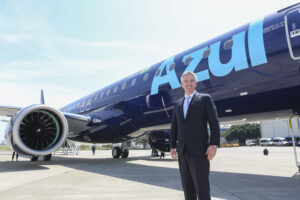
Courtesy Embraer
São José dos Campos, Brazil – Embraer delivered last week from its main facility in São José dos Campos, its first E195-E2, the biggest of the three members of the E-Jets E2 family of commercial aircraft. The recipients are AerCap, the world’s largest aircraft leasing company, and Azul Linhas Aéreas Brasileiras S.A. Azul is the global launch operator for the E195-E2 and has placed firm orders for 51 of the type. The airline will receive another five aircraft in 2019.
Azul is configuring the E195-E2 in a single class layout with 136 seats and will deploy the aircraft on several domestic and international routes.
“Over the last 10 years Azul revolutionized the Brazilian aviation market. We have helped to double the domestic market by providing service to regions, cities and communities that have never had service before, all thanks to the Embraer E195-E1 aircraft. Now with the E195-E2 we are ready to launch the next chapter in Brazilian aviation. We could not be more proud to bring this Brazilian aircraft, built with Brazilian technology and innovation to the Brazilian skies”, said David Neeleman, Azul’s founder and chairman of the board. “The E2 represents the next significant step in Azul’s fleet transformation, further powering our margin expansion story well into the years to come”, concluded Neeleman.
“Everyone at AerCap is thrilled to deliver the world’s first Embraer E195-E2 aircraft to Azul. We have no doubt that this incredible aircraft will drive two of Brazil’s global leaders to new heights. We wish both Embraer and Azul every success with the E-Jets E2 program and we look forward to working with both for many, many years to come,” said Aengus Kelly, CEO of AerCap.
In April, the E195-E2 received its Type Certificate from three regulatory authorities: ANAC, the Brazilian Civil Aviation Agency (Agência Nacional de Aviação Civil); the FAA (U.S. Federal Aviation administration) and EASA (European Aviation Safety Agency).
Flight tests confirmed that the aircraft is better than its original specification. Fuel consumption is 1.4% lower than expected – that’s 25.4% less fuel per seat compared to the current-generation E195. Maintenance costs are 20% lower. The E195-E2 is the most environmentally friendly aircraft in its class, having the lowest levels of external noise and emissions.
Like the E190-E2, the E195-E2 has the longest maintenance intervals in the single-aisle jet category with 10,000 flight hours for basic checks and no calendar limit for typical E-Jet operations. This means an additional 15 days of aircraft utilization over a period of ten years compared to current generation E-Jets.
Source Embraer / Edited By Airline Adviser 09/16/19
Storms, Strikes, Delays, Demonstrations, and Heat
By Airline Adviser | | Airline Adviser
Well it’s been a tough Summer for the airline industry world-wide. From thunderstorms in the Summer to Airlines with fleets of Boeing Max 8 aircraft being grounded makes for delays and cancellations. A very hot Summer that gives many areas heat beyond records can also cause flight delays. Strikes from various parts of the world from some airline pilots to airport ground crews like those of Barcelona in Spain. Even cargo airlines have had there fair share of problems this summer 2019.
Some airlines themselves suffer from breakdowns disputes and demonstrations we have seen more than ever in Hong Kong. We at Airline Adviser cover worldwide in the industry and are here for you. Simply for up to date reporting see our twitter site @AirlineAdviser . This gives us the tools to provide you the most crucial information. Without a doubt being there keeping you informed and advise as to what’s happening regarding those airlines or airports that might be affected.
Now that Hurricane Season has shown us how many of us should take it seriously without a doubt. Having been in many in South Florida and our experience in both fire and aviation industry our dedication to keeping you up to date is in our heart. We are your source in many ways. At this time Hurricane Dorian is approaching east coast of Florida with uncertainty of exact path and scale. May reports say it can be as dangerous as a category 4 or slightly less. Either way it is a strong and dangerous one that has anyone from Key West- Miami all the way up to Jacksonville and all parts inland concerned. Monday Labor Day is projected to make land fall and many like us are monitoring.
We are not just a website therefore we strong suggest you stay update with us like many others on twitter. Our feeds can be observed on the home page bottom right of our site www.airlineadviser.com Do not forget major airports you can see at our airports and facilities page. All major airlines will be monitoring just as we are same goes for airports. We will be with them too sharing this. Please be safe and remember safety first.
Airline Adviser 08/29/19
KLM Intention for up to 35 E195-E2 Jets
By Airline Adviser | | Airline Adviser, Embraer, KLM Cityhopper
Paris, France– Embraer announced at the 53rd International Paris Air Show, KLM Cityhopper’s intention to purchase up to 35 E195-E2 jets, 15 firm orders with purchase rights for a further 20 aircraft of the same model. This intention, which still requires a Purchase Agreement, has a value of USD 2.48 billion based on Embraer’s current list prices. The order will be added to Embraer’s backlog as soon as a firm contract is completed.
“With a fleet of 49 E-Jets, KLM is already the largest Embraer operator in Europe and adding KLM to the E2 family of operators would be a huge vote of confidence in Embraer, our after sales care, and the E2 program. The aircraft uses 30% less fuel per seat compared to KLM Cityhopper’s current E190s. And in terms of aircraft noise, the aircraft is the quietest in its class both internally for passengers, and externally, by a significant margin*”, said John Slattery, President and CEO, Embraer Commercial Aviation.
KLM President & CEO Pieter Elbers, said, “Embraer has been a key partner for KLM and Cityhopper over the past ten years. Our customers appreciate the E190 and E175’s. The E2 would be a welcome addition to the KLM fleet, giving us greater capacity flexibility and help to manage down costs. In addition, the environmentally friendly E195-E2 also supports our sustainability goals with lower levels of noise and emissions.”
KLM Cityhopper started the process of replacing its fleet of venerable Fokker aircraft for E-Jets in 2008, in order to enhance the existing network and to permit the efficient development of new routes. KLM Cityhopper’s all Embraer fleet currently has 49 E-Jets, the largest E-Jet fleet in Europe – 32 E190s and 17 E175s.
Source Embraer / Edited By Airline Adviser 06/27/19
Fuji Dream Airlines Orders Two E175s
By Airline Adviser | | Airline Adviser, Embraer, Fuji Dream Airlines
Paris, France – Embraer announced at the 53rd International Paris Air Show, that it has signed a contract with Japan’s Fuji Dream Airlines (FDA) for a firm order of two E175 jets. The order has a value of USD 97.2 million, based on 2019 list prices, and was already included in Embraer’s 2019 first-quarter backlog as “undisclosed.”
“We are extremely pleased to continuously grow our fleet and our relationship with Embraer,” said Yohei Suzuki, Chairman and CEO of Fuji Dream Airlines. “FDA currently operates 14 aircraft – three E170s and eleven E175s. These new aircraft will give us the ability to grow our capacity, allowing us to add more routes and frequencies, while also offering our passengers the best cabin in its category.”
FDA’s new E175s will be configured in a single-class layout with 84 seats, with deliveries starting in 2019. Embraer delivered the first E-Jet, an E170, to Fuji Dream Airlines in 2009.
“After nearly 10 years of operations, Fuji Dream Airlines has established itself as an exemplary model for sustainable growth with the support of the E175’s unrivaled attributes underpinning the success of their continued network expansion with new point-to-point services,” said Cesar Pereira, Asia Pacific Vice President, Embraer Commercial Aviation. “As a testament to Embraer’s merits, there will be a total of 48 E-Jets flying in Japan by the end of 2019. Of which, FDA’s all-Embraer fleet of 14 aircraft represents the largest of its kind in Asia and has a world leading 99.83% dispatch reliability – yet another example of how Embraer’s products and customer support have been setting new standards in the industry.”
The E175 is the best seller of the E-Jets family with more than 770 orders from airlines and lessors around the world. Since January 2013, Embraer has sold more than 565 E175s to airlines in North America alone, earning more than 80% of all orders in the 70-76-seat jet segment.
Source Embraer / Edited By Airline Adviser 06/27/19
Binter Sign an Order for Two Additional E195-E2s
By Airline Adviser | | Airline Adviser, Binter, Embraer
Paris, France– Embraer announced at the 53rd International Paris Air Show, that it has signed a contract with Binter, of Spain, for two additional E195-E2s, confirming purchase rights from the original contract, signed in 2018. The two new E195-E2s will be included in Embraer’s 2019 second-quarter backlog and have a value of USD 141.8 million, based on Embraer’s current list prices. The airline is celebrating 30 years of operations in 2019.
“We are extremely proud that Binter is reinforcing its commitment to the E2 program and has confirmed these new acquisitions even before the first E195-E2 delivery to the airline. We wish continued success to Binter as it modernizes its fleet and continues to expand into new international markets in Europe and Africa”, said Martyn Holmes, Vice President, Europe, Russia & Central Asia, Embraer Commercial Aviation.
Binter will receive its first E195-E2 jet in the second half of 2019, becoming the first European customer of the E-Jets E2’s largest model. The airline is configuring the aircraft with 132 seats in a very comfortable single-class layout.
Source Embraer / Edited By Airline Adviser 06/27/19
Azul Sign Pool Program to Support New E195-E2 fleet
By Airline Adviser | | Airline Adviser, Azul Brazilian Airlines, Embraer
Paris, France– Embraer announced at the 53rd International Paris Air Show the signing with Azul Linhas Aereas Brasileiras, S.A. of a long-term Flight Hour Pool Program agreement to provide repairable component support for the carrier’s brand new fleet of Embraer E195-E2 jets, the second generation of the E-Jets family.
Azul, which placed a total order of 51 E195-E2, is the global launch customer for the new aircraft and will receive the first delivery during the second half of this year. The multiyear Flight Hour Pool Program agreement includes material services engineering and advanced component exchanges from Embraer spare parts facilities in Ft. Lauderdale, Florida, USA.
“Signing up for this service of Embraer reiterates our philosophy of recognizing the value of Brazilian products. We are the only airline in the country to acquire aircraft manufactured in Brazil and, strengthening our partnership with Embraer, we will be the launchers of the new generation of the company’s E-Jets. This support which we agreed upon with them will guarantee an even more efficient operation, with greater aircraft competitiveness and availability, which will also impact the satisfaction of those who fly Azul,” said Alex Malfitani, Vice President of Finance, Azul.
Embraer’s Flight Hour Pool Program, which currently supports more than 40 airlines worldwide, is designed to allow airlines to minimize their upfront investment on high value repairable inventories and resources and to take advantage of Embraer’s technical expertise and its vast component repair service provider network. The results are significant savings on repair and inventory carrying costs, reduction in required warehousing space, and the virtual elimination of the need for resources required for repair management, while ultimately providing guaranteed performance levels.
The E195-E2 is the second of three new aircraft models that make up the E2 family of aircraft. The E190-E2 is already being operated by Norway’s Widerøe, the largest regional airline in Scandinavia, and Air Astana, a flag carrier of Kazakhstan.
Source Embraer / Edited By Airline Adviser 06/27/19
United Airlines sign contract for up to 39 E175s
By Airline Adviser | | Airline Adviser, Embraer, United Airlines
Paris, France– Embraer announced, at the 53rd International Paris Air Show, that it has signed a contract with United Airlines for up to 39 E175s. The order comprises 20 firm aircraft and 19 options in a 70-seat configuration. The order has a value of USD 1.9 billion, based on Embraer’s current list prices, with all options being exercised. The firm order will be included on Embraer’s 2019 second-quarter backlog. Deliveries are expected to begin in the second quarter of 2020. These aircraft will replace older 70-seat aircraft currently operated by United’s regional partners.
“With this contract, we have the opportunity to continue serving United’s fleet with our class-leading E175 platform,” said Charlie Hillis, Vice President, Sales & Marketing, North America, Embraer Commercial Aviation. “Embraer’s dedication to finding solutions that meet our customer’s needs is the primary reason we continue to outperform in this market segment.”
“The E175, operated by our regional partners, has proven to be an important part of our fleet as we continue to grow our mainline airline and provide an enhanced customer experience,” said Gerry Laderman, Chief Financial Officer of United Airlines. “As we focus on providing our customers the utmost comfort and convenience, we will rely on aircraft like the E175 to help us achieve our goal of delivering the best experience in the sky.”
Including this new contract, Embraer has sold more than 585 E175s to airlines in North America since January 2013, earning more than 80% of all orders in this 70-76-seat jet segment.
Embraer is the world’s leading manufacturer of commercial aircraft up to 150 seats with more than 100 customers from all over the world. For the E-Jets program alone, Embraer has logged more than 1,800 orders and 1,500 aircraft have been delivered. Today, E-Jets are flying in the fleet of 75 customers in 50 countries. The versatile 70 to 150-seat family is flying with low-cost airlines as well as with regional and mainline carriers.
Source Embraer / Edited By Airline Adviser 06/27/19
Boeing Statement on 737 MAX software
By Airline Adviser | | Airline Adviser, Boeing
CHICAGO, June 26, 2019 – The safety of our airplanes is Boeing’s highest priority. During the FAA’s review of the 737 MAX software update and recent simulator sessions, the Federal Aviation Administration (FAA) identified an additional requirement that it has asked the company to address through the software changes that the company has been developing for the past eight months. The FAA review and process for returning the 737 MAX to passenger service are designed to result in a thorough and comprehensive assessment. Boeing agrees with the FAA’s decision and request and is working on the required software. Addressing this condition will reduce pilot workload by accounting for a potential source of commanded stabilizer motion. Boeing will not offer the 737 MAX for certification by the FAA until we have satisfied all requirements for certification of the MAX and its safe return to service.
Source Boeing / Shared By Airline Adviser 06/27/19
Turkish Airlines expands network with its first Boeing 787-9 Dreamliner
By Airline Adviser | | Airline Adviser, Boeing, Turkish Airlines
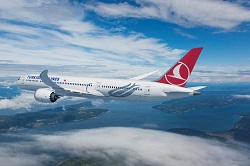
SEATTLE, June 26, 2019 – Boeing [NYSE:BA] delivered the first 787-9 Dreamliner for Turkish Airlines, which plans to use the airplane’s fuel efficiency, range, reliability and size to operate new non-stop international routes such as Bali, Bogota-Panama, Washington and Atlanta.
“Turkish Airlines has been committed to continuously expanding its range of services on and off-ground as it grows in reach and flies to more international destinations than any other carrier in the world. With this goal in mind, we’re thrilled to reach new horizons with the addition of the 787-9 Dreamliner to our fleet flying from our new home, Istanbul Airport,” said M. İlker Aycı, Turkish Airlines’ Chairman of the Board and the Executive Committee. “The aircraft’s advanced technology, fuel efficiency, and passenger-centric cabin design will all help us remain the first choice for travelers and provide our loyal flyers across the globe with a best-in-class experience for years to come.”
Turkish Airlines’ Dreamliner has seating capacity for 300 passengers, including 270 economy class seats and 30 business class seats. The carrier’s 787 includes long haul economy class seats and business class monuments produced in Turkey by Turkish suppliers.
Source Boeing / Edited By Airline Adviser 06/27/19
EVA Air Takes Delivery of Its First Boeing 787-10 Dreamliner
By Airline Adviser | | Airline Adviser, Boeing, Eva Air
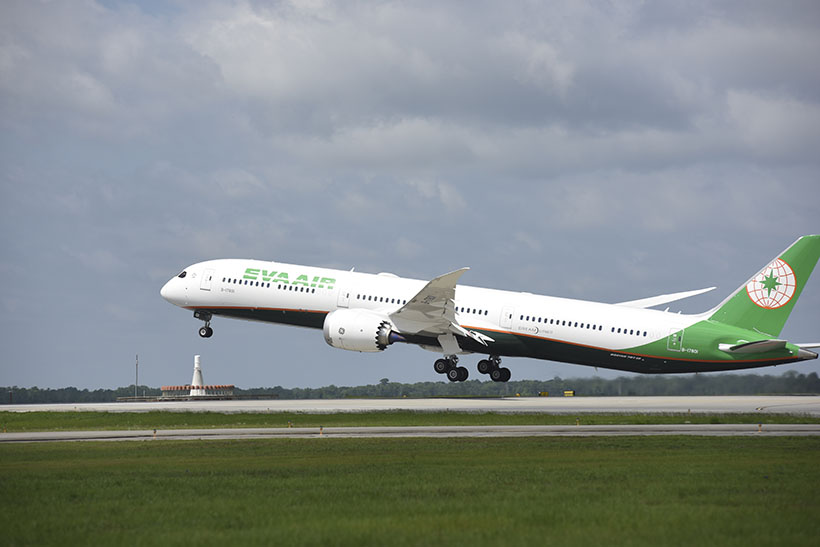
NORTH CHARLESTON, S.C., /PRNewswire/ — EVA Air today celebrated the delivery of its first Boeing [NYSE:BA] 787-10 Dreamliner, marking the first of 20 super-efficient 787-10s the carrier plans to use on high-density routes within Asia later this summer. The airline, which is also celebrating its 30th anniversary this year, already operates a fleet of four 787-9 Dreamliners.
“The 787 Dreamliner has become the flagship of our fleet and we will leverage the airplane’s unrivaled fuel efficiency, reliability and size to operate high-density markets in Asia,” said Steve Lin, Chairman of EVA Air. “The 787-10 offers around 15 percent more cabin space and cargo capacity compared to our existing 787-9s and this added capability will allow us to explore new opportunities for future growth in the emerging markets within Asia Pacific. As a five-star airline, we are committed to providing world-class service and products to our customers and these new airplanes will be key to our long-term success.”
Built with lightweight composite materials and powered by advanced GEnx engines, EVA Air’s 787-10 is the largest member of the fuel-efficient and passenger-pleasing Dreamliner family. At 224 feet long (68 meters), EVA Air’s 787-10 can serve 342 passengers in a two-class configuration, which is 38 more seats than EVA Air’s 787-9 Dreamliner.
A member of Star Alliance, EVA Air serves international routes with approximately 565 weekly flights. Onboard the airline’s new 787 Dreamliner, passengers can experience EVA Air’s new Royal Laurel class seats designed by Designworks, a BMW Group company. At 23 inches wide, the new seats feature privacy panels, full lie-flat capabilities as well as enhanced in-flight entertainment systems. EVA Air also partnered with Teague, to redesign its economy class seats, which are produced by Recaro.
Source Boeing / Edited By Airline Adviser 06/27/19
Qatar Airways Announce New Commitment for Five 777 Freighters
By Airline Adviser | | Airline Adviser, Boeing, Cargo, Cargo & Freight, Qatar Airways
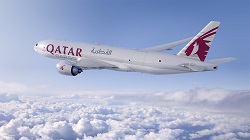
LE BOURGET, France /PRNewswire/ — Qatar Airways, one of the world’s leading air cargo carriers, announced a commitment to purchase five additional 777 Freighters from Boeing [NYSE: BA]. The deal, valued at $1.8 billion at list prices, was unveiled at the Paris Air Show and signed in the presence of His Excellency Jassim Saif Ahmed Al-Sulaiti, Qatari Minister of Transport and Communications.
“I am very pleased that Qatar Airways has today signed this landmark order for five new Boeing 777 Freighters to add to our cargo fleet,” said His Excellency, Mr. Akbar Al Baker, CEO, Qatar Airways Group. “It will increase our 777 freighter fleet by a full 20 percent, enabling us to further develop our business and offer new customers the chance to experience a truly first-class logistics service. This is an order that will propel our growth and, I firmly believe, confirm us as the leading cargo operator in the world.”
Qatar Airways has rapidly grown its air cargo operations to serve more than 60 global destinations, becoming one of the top international air freight operators in the world. The latest freighter deal builds on the airline’s 777 Freighter order book as the airplane has become the backbone of Qatar Airways freighter fleet. It currently operates 23 freighters, including 16 Boeing 777 Freighters.
The 777 Freighter is the world’s largest and most capable twin-engine freighter. It can fly 4,970 nautical miles (9,200 kilometers) with a payload of 224,900 lbs (102,010 kg). The airplane’s long range translates into significant savings as fewer stops mean lower landing fees, less congestion, lower cargo handling costs and shorter delivery times.
Customers from around the world have ordered 217 777 Freighters since the program began in 2005, including a record 45 units in 2018. Boeing is the air cargo market leader, providing over 90 percent of the dedicated freighter capacity around the world.
Source Boeing / Edited By Airline Adviser 06/27/19
ASL announce agreement for 20 737-800 Boeing Converted Freighters
By Airline Adviser | | Airline Adviser, ASL Aviation Holdings DAC, Boeing, Cargo, Cargo & Freight
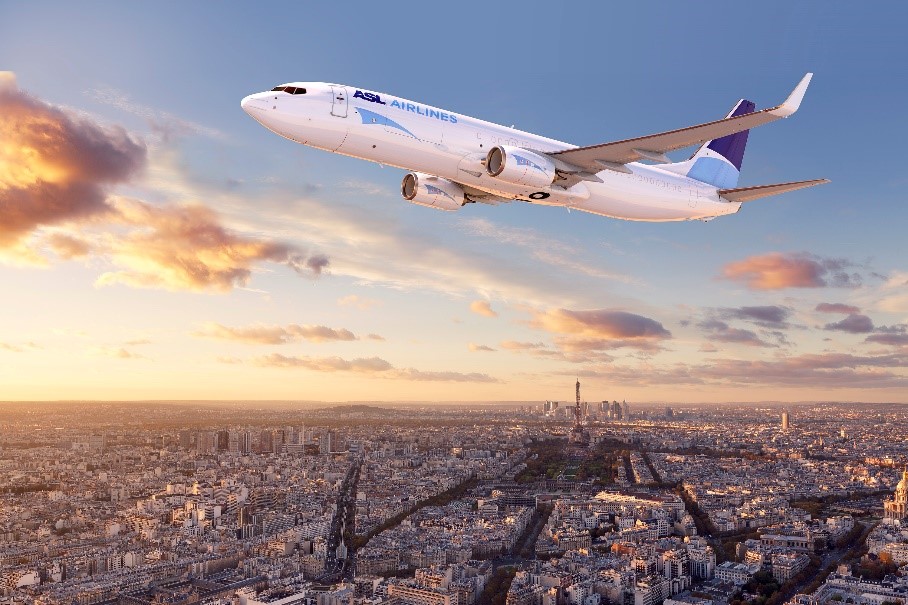
LE BOURGET, France,—ASL Aviation Holdings DAC (ASL) and Boeing [NYSE: BA] signed a Memorandum of Understanding for 20 737-800 Boeing Converted Freighters (BCF), bringing the world’s first Next-Generation 737-800 freighter conversion to 120 orders and commitments, from eight customers. The agreement includes 10 firm orders and 10 purchase rights.
“Having operated two leased 737-800BCFs across our wide European network, we are very pleased with how the flexibility and reliability of these freighters fulfill our operational needs in meeting our customer requirements,” said Hugh Flynn, Chief Executive, ASL Aviation Holdings. “The aircraft is highly efficient and right-sized for our developing operations on behalf of our express cargo customers who are experiencing growing demand. The 737-800BCF will also give us access to new markets.”
Operating on six continents, ASL provides network solutions to express freight integrators, transporting more than 357,000 metric tones of cargo in 2018.
“This order is a great testimonial of the unique capabilities of a 737-800 converted freighter. ASL Aviation has seen firsthand how this platform is perfectly suited to fly express cargo on domestic and short haul routes. We are honored that ASL Aviation is growing its business with the 737-800BCF,” said Ihssane Mounir, senior vice president of Commercial Sales & Marketing for The Boeing Company. “With more operators seeking out the 737-800BCF, we are looking to expand our conversion capacity to support our customers and their growth plans.”
Boeing recently inaugurated new conversion lines at Boeing Shanghai Aviation Services (BSAS) and Taikoo (Shandong) Aircraft Engineering Company (STAECO), while looking to expand further. The program is committed to more than double 737-800BCF output this year, going from eight conversions in 2018 to 17 in 2019.
Boeing predicts that 2,650 freighters will be delivered between 2018-2037, with more than 60 percent of these deliveries comprised of passenger-to-freighter conversions. Already operating on four continents (Africa, Asia, Europe, and North America) after entering service last year, the 737-800BCF is certified by various global regulators: the U.S. Federal Aviation Administration, the European Aviation Safety Agency, the Civil Aviation Administration of China, and Russia’s Federal Air Transport Agency.
The 737-800BCF carries more payload – up to 23.9 tones (52,800 lbs.) – and flies farther – 2,000 nautical miles (3,750 km) compared to 737 Classic freighters. It also offers operators improved fuel efficiency, lower operating cost, and higher reliability than previous standard-body freighters.
Source Boeing / Edited By Airline Adviser 06/27/19
China Airlines to Upgrade Fleet with Boeing 777 Freighters
By Airline Adviser | | Airline Adviser, Boeing, Cargo, Cargo & Freight, China Airlines
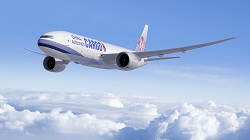
LE BOURGET, France, /PRNewswire/ — Boeing [NYSE: BA] and China Airlines announced the airline’s intent to order up to six 777 Freighters to modernize its cargo fleet. China Airlines plans to transition to the world’s largest and longest range twin-engine freighter as it launches operations from Taipei to North America and Europe – two key markets that provide higher yields for the carrier.
“Air cargo is an important part of our overall business and the introduction of these new Boeing 777 Freighters will play an integral role in our long-term growth strategy,” said China Airlines Chairman Hsieh Su-Chien. “As we transition our Freighter fleet to the 777Fs from the older 747Fs, this will enable us to deliver world-class services to our customers more efficiently and reliably.”
The 777 Freighter is capable of flying 4,970 nautical miles (9,200 km) with a maximum payload of 102,010 kg (224,900 lbs). The airplane will allow China Airlines to make fewer stops and reduce associated landing fees on these long-haul routes, resulting in the lowest trip cost of any large freighter and superior ton-mile economics. In addition, the 777 Freighter features market-leading capacity for a twin-engine freighter, accommodating 27 standard pallets, measuring 96 inches by 125 inches (2.5 m x 3 m) on the main deck. This allows for lower cargo handling costs and shorter cargo delivery times.
“The global air freight market is forecasted to double over the next 20 years, and the 777 Freighter’s market-leading capabilities and economics will help China Airlines extend their network and grow their cargo business,” said Ihssane Mounir, senior vice president of Commercial Sales and Marketing of The Boeing Company. “We are proud to expand our partnership with China Airlines, building on our successful introduction of the 777-300ER passenger jet a few years ago. We look forward to delivering new 777 Freighters into their world-class fleet.”
Source Boeing / Edited By Airline Adviser 06/27/19
Air Lease Corporation Announce Commitment for Five 787-9 Dreamliners
By Airline Adviser | | Air Lease Corporation, Airline Adviser, Boeing
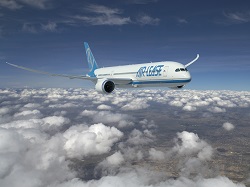
LE BOURGET, Paris /PRNewswire/ — Boeing [NYSE: BA] and Air Lease Corporation [NYSE: AL; “ALC”], a leading aircraft leasing company, announced a commitment during the Paris Air Show to purchase five 787-9 Dreamliners, valued at $1.5 billion at list prices.
“Demand for reliable, versatile, and fuel-efficient airplanes is at an all-time high,” said Steven Udvar-Házy, Executive Chairman of Air Lease Corporation. “These five Boeing 787-9 aircraft are required by our airline customers to satisfy strong ALC lease placements of the 787.”
Boeing has sold more than 1,400 Dreamliners since the program’s introduction, making it the fastest selling widebody jet in history. The 787 Dreamliner allows airlines to reduce fuel use and emissions by 20 to 25 percent and serve far-away destinations.
The 787-9, a stretch of the 787-8, can fly 296 passengers 7,635 nautical miles (14,140 km) in addition to carrying more cargo and allowing airlines to profitably grow routes first opened by the 787-8. The combination of unrivaled fuel efficiency and long range has helped airlines flying the 787 family of airplanes save more than 36 billion pounds (16 billion kilograms) of fuel and open more than 235 non-stop routes.
Source Boeing / Edited by Airline Adviser 06/27/19
Recent Comments